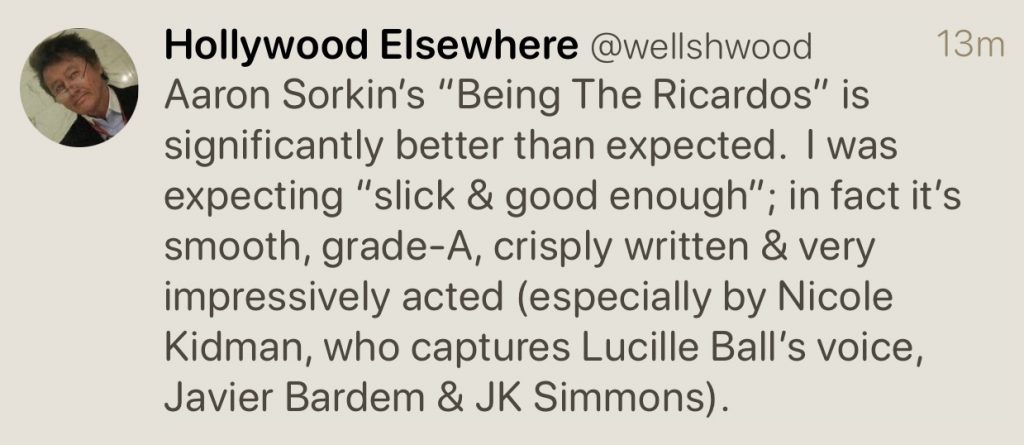
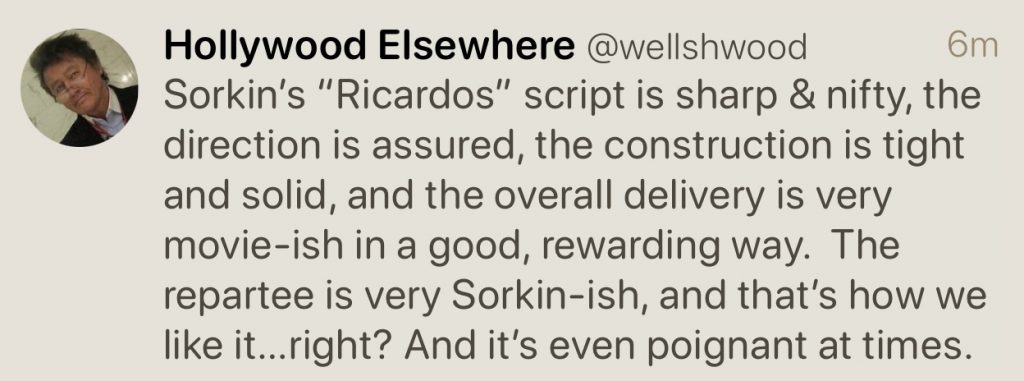

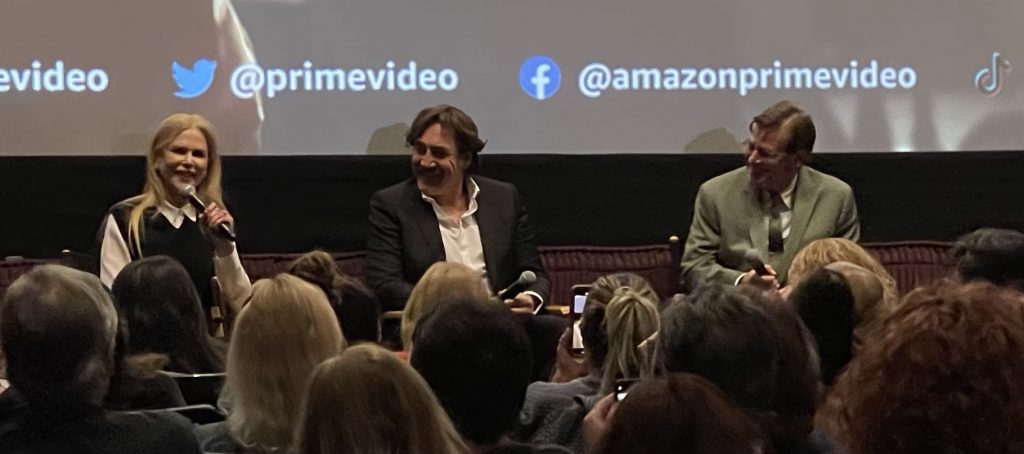
Friendo to HE: “C’mon C’mon was so mediocre. I can’t get over critics digging this Mike Mills film.”
HE to Friendo: “I’ve never been much of a Mills fan. That Santa Barbara movie with Greta Gerwig was kind of a drag. 20th Century Friendos….Women, I mean. 20th Century Women.”
Friendo to HE: “I’m no fan either.”
HE to Friendo: “Smooth and mellow Joaquin doesn’t wash. I don’t want to hang with a nice, sensitive, caring father figure played by that fucking guy. To me Joaquin is a twitchy, flakey, cigarette–smoking weirdo. I can’t accept him as a kind, gentle, soft-caressing fellow.”
Friendo to HE: “I wrote this: ‘As much as I’ve championed Phoenix as one of the great living actors, it pains me to say that he’s miscast here. The actor tries to, for once, embody a ‘normal’ character but it just doesn’t work. He’s best at playing unstable eccentrics rather than any kind of subdued, big-city schlub a la Mark Ruffalo.”
Amazon previously offered Otto Preminger‘s Advise and Consent (’62) as an HD streamer, but no longer. Which means that someone (Kino Lorber?) is preparing a Bluray release.
Don Murray‘s closeted gay character, Sen. Brig Anderson of Utah, winds up killing himself over a gay blackmail attempt, which tells you how plugged-up the original 1959 Allen Drury book was.
“This was the first commercial film to include a scene in a gay bar, and I have to admit that even today the vibe is a bit much. (It reminds me of a Palm Springs gay bar I accidentally walked into once, and the smell of strong cologne was almost suffocating.) The first gay film that I really enjoyed and relaxed with was William Friedkin‘s The Boys In The Band (’70), but I’ve mentioned that once or twice.
Steve Hayes (“Tired Old Queen at the Movies”) delivers a savvy assessment:
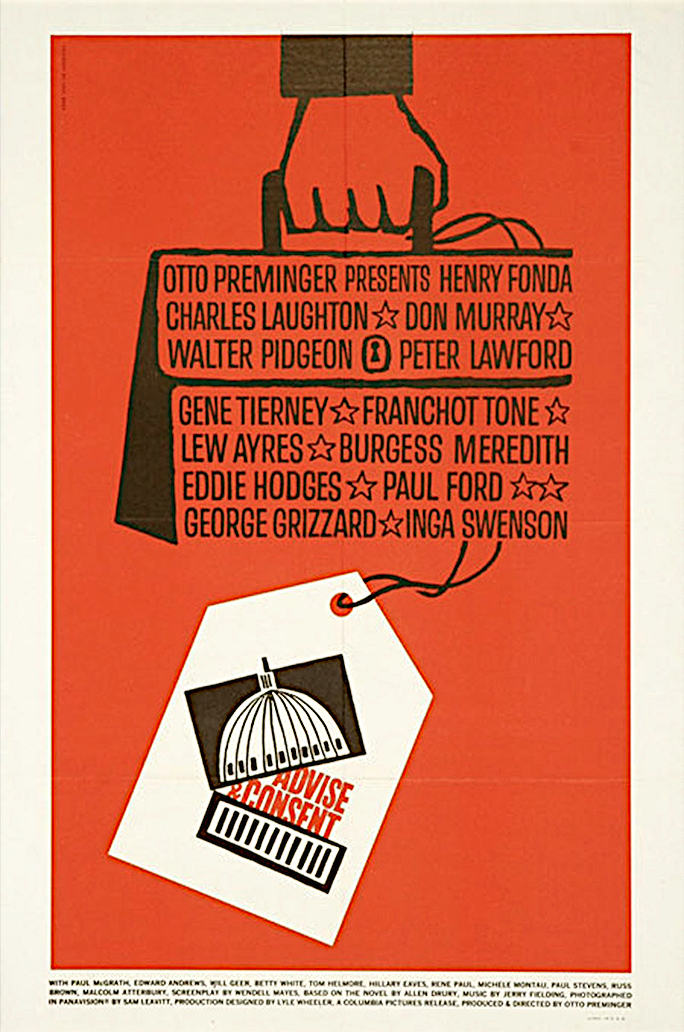
I took one look at this snap of screenwriter Daniel Waters and immediately thought of Francis Bacon‘s screaming pope paintings. And I thought “this could be a horror film character…a subdued, stay-at-home house dad who fancies himself as a gourmet chef, and suddenly he loses his mind,” etc. Just remove the spatula and replace it with a butcher knife or meat cleaver.
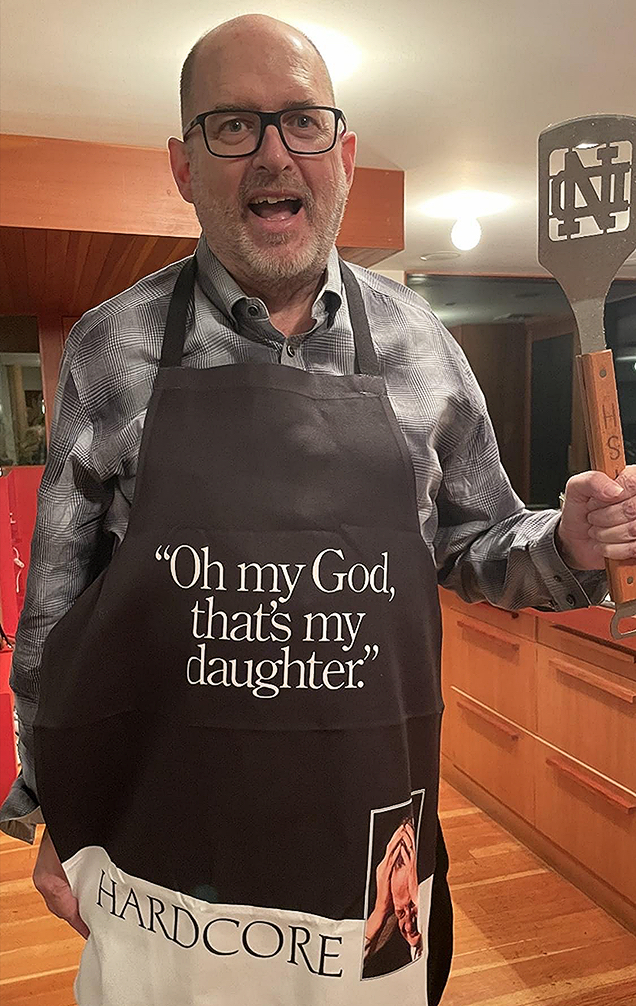


Ten weeks after Kenneth Branagh‘s Belfast had its first showing at the Telluride Film Festival and after constant latherings of praise from film critics and festival audiences, it’s finally playing before ticket buyers in the gladiator arenas. Reactions from the HE community would be greatly appreciated. Please focus part of your writings on the music — to what extent does the musical score (i.e., the Van Morrison songs) make a difference? Anyway, that’s it. Thank you.



On 10.21 the House of Representatives voted to hold Steve Bannon in contempt of Congress over defying the January 6th committee and refusing to cooperate, etc. Attorney General Merrick Garland had no choice but to seek an indictment, but the House vote was over three weeks ago. From this corner it seemed as if the Justice Department was dragging ass. I don’t know if it could have been fast-tracked or not. I only know that a lot of activist Twitter types seemed irked and annoyed at the pace of things.

..and had witnessed the devastating toll that The Great Depression took and had personally witnessed how so many millions were suddenly without a pot to piss in, you would have probably felt some degree of sympathy and support for the ideas behind Communism and the party’s general anti-capitalist theology.
Hence a lot of people attended meetings, flirted with supporting the party (at least nominally), and in some cases confirmed their support with a signature on this or that form. Like Lucille Ball did in 1936. And Elia Kazan and many other left-leaning Hollywood types did. Even my mother, who became a mildly conservative moderate after marrying and raising a family, was a kind of “red” in her college years.
The same type of impressionable teens and 20somethings who believed during the ’30s that Communism was a more humane system than capitalism were cut from the same cloth as ’60s street radicals (i.e., Students for a Democratic Society, Yippies, Chicago 7 supporters) as well as today’s wokester terrorists. But of course, younger people gradually grow out of that shit.
Classic line “If you’re not a communist at the age of 20, you haven’t a heart. If you’re still a communist at the age of 30, you haven’t a brain.”
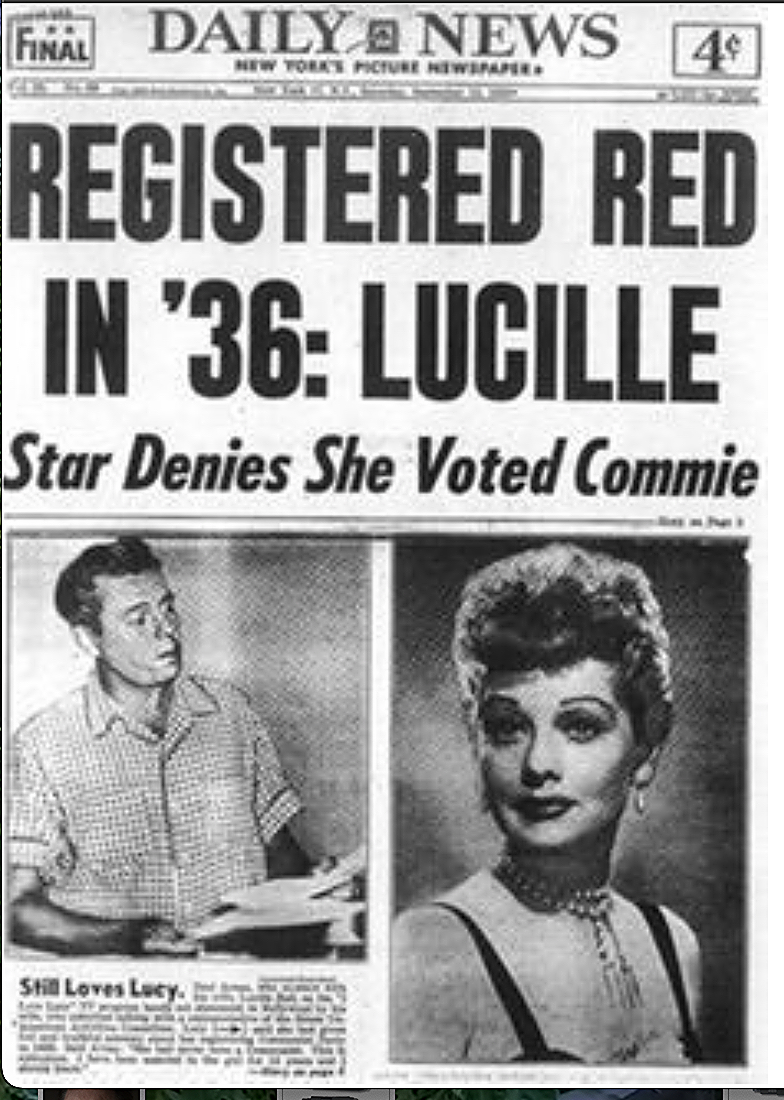
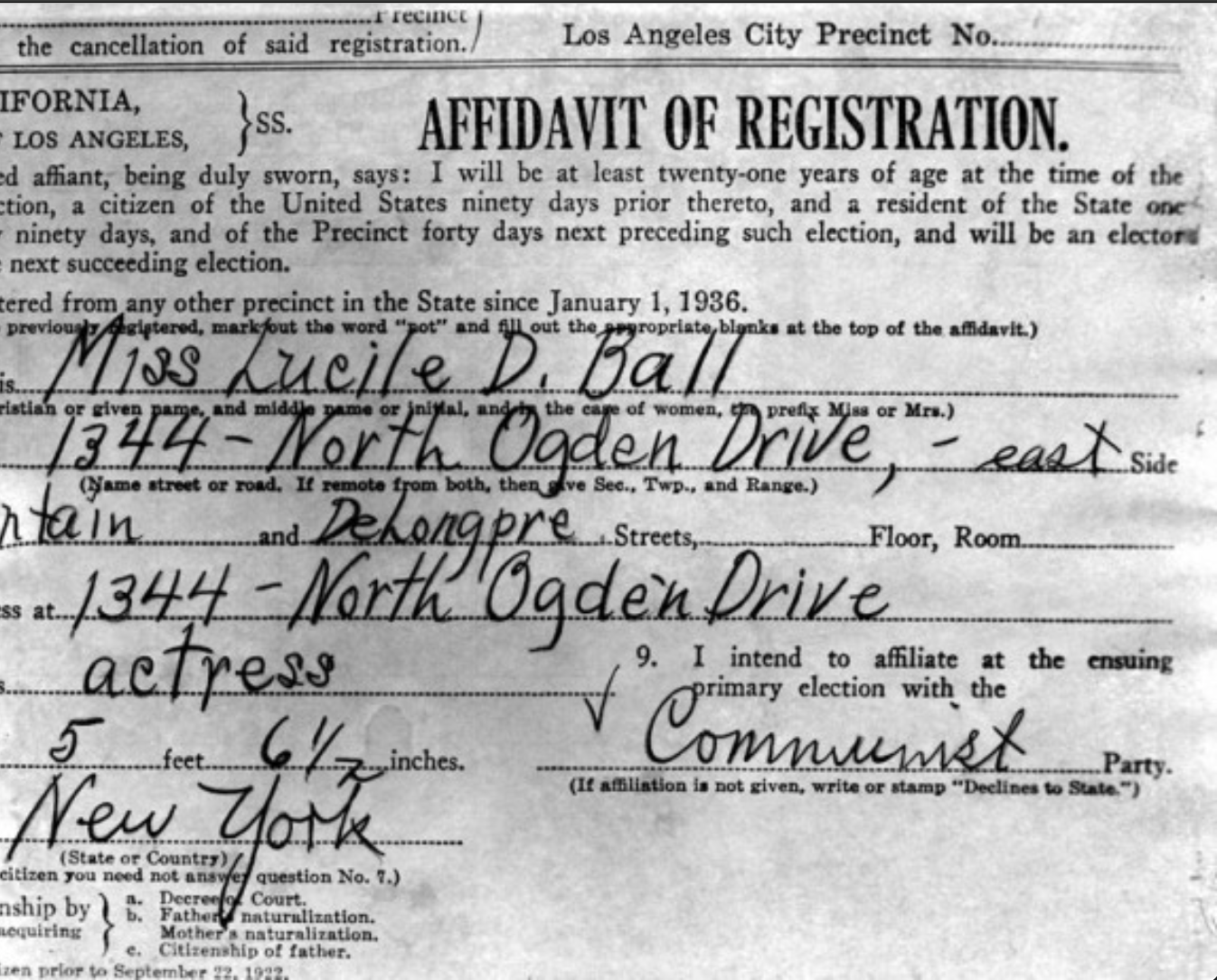
If and when the hair-trigger Twitter mob tries to to revive that idiotic Ansel Elgort + “Gabby” narrative about alleged statutory rape, just remember that the whole story was completely fraudulent. ‘
The story ignited in June 2020 and ran out of gas after three or four days.
Ansel and “Gabby’s” relationship happened in New York State in late 2014, when she was old enough (17) to consent. Elgort turned 20 on 3.14.14. He and Gabby were sexual and then Elgort hurt her feelings by ignoring her messages in some kind of passive-aggressive way. That’s all it was. It was nothing. Relationships will occasionally leave bruises. I know what it feels like to be casually dumped or abruptly ignored by a lover, but it happens. Tough shit, life in the big city, etc.
“Canyon Coyote” responds: “My point isn’t that Elgort did anything wrong but there is a perception that he’s part of the ‘bad men’ group. It seems like dudes who fall into that lot, fairly or unfairly, consistently have to cope with whisper campaigns against them for years. The Aziz Ansari bad-date story is still a thing and he did was act in a presumptuous or less-than-fully-sensitive manner.

Of all the Facebook-software-generated birthday greetings that came in today, I was especially moved by one from Dan Richter, who played “Moonwatcher” in 2001 A Space Odyssey.
I haven’t spoken to Dan face-to-face for a full 28 years, but we’ve kept up the correspondence. Of all the famous people I’ve met and regard on friendly terms, I suspect that 100 years from now more people will be familiar with Richter (or at least his legendary performance) than any present-day Hollywood hotshot you could name.
Be honest — how many people in the year 2121 will know or care who Chris Pratt was? Or Dwayne Johnson? Or any other quarter-of-an-inch-deep actor of note? How many people will recall who Ed Sheeran was? Paul McCartney or Mick Jagger, okay, but Sheeran?
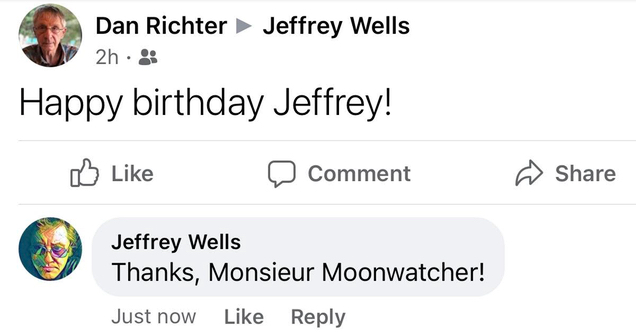
Here’s an L.A. Times Calendar piece that I wrote in ’93 about Dan Richter, the ’60-era mime who played the bone-tossing Moonwatcher in Stanley Kubrick‘s 2001: A Space Odyssey.
The last time I linked to this piece was in July ’08. Here are three scans of the original article — #1, #2 and #3.
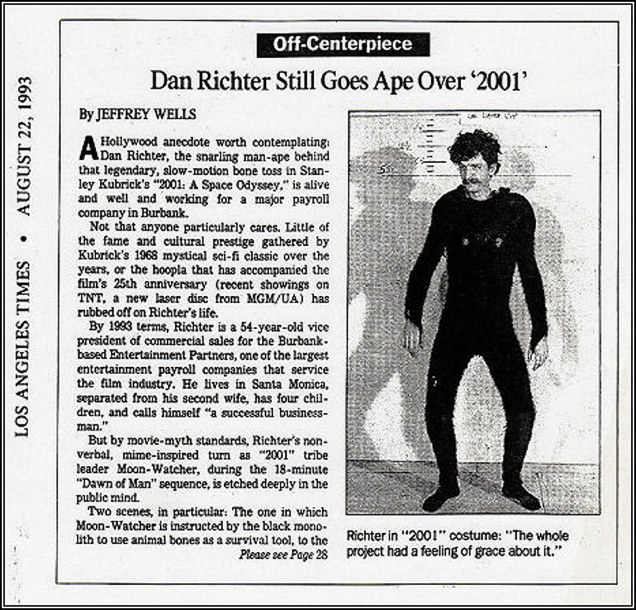
My father met Dan at a Connecticut AA meeting in ’92 or thereabouts, and at my dad’s suggestion I called a while later and visited Dan at this home in Sierra Madre for an interview. I remember he was dealing with chemotherapy at the time. He’s still with us and doing fine .
In 2012 Richter published a memoir — “The Dream Is Over” — mainly about a four-year period that he spent with John Lennon and Yoko One (’69 to ’73).
With all the Licorice Pizza buzz and the related topic of May-December love affair flicks, I was startled to read about Richard Donner‘s Lola (aka Twinky), a 1970 dramedy about a 38 year-old novelist (Charles Bronson) falling for and marrying a 16 year-old (Susan George, actually 19 during filming). Looks awful! Bronson’s character writes porn novels (!).
A much better film in this vein was Bertrand Blier‘s Beau Pere (’81), about a 30-year-old pianist (Patrick Dewaere) who has an affair with his 14-year-old stepdaughter (Ariel Besse) after her mother dies in a car accident. Can you imagine Twitter’s reaction to such a film? Can you imagine anyone even flirting with making it? Much, much worse that the Woody and Soon-Yi thing.
Yeah, I know — the Licorice Pizza situation isn’t exactly “May-December” but it’s close enough, I guess. A 25 year-old woman (Alana Haim) being attracted to a 15 year-old male actor (Connor Hoffman) doesn’t seem too beyond the pale, but it keeps Haim from getting entangled with Hoffman for most of the running time.
There was a slight age-inappropriate discussion with Luca Guadagnino‘s Call Me By Your Name (’17), due to Timothee Chalamet‘s Elio being 17 to Armie Hammer‘s Oliver being 24. But mostly no one cared.
Older women falling for younger fellas movies are much more palatable. And no one thinks there’s anything tragic or hurtful about teenage guys having it off with older women…c’mon. When I was 15 and 16 I used to dream about getting lucky with this or that female teacher. It would have been heaven on earth. And when I was in my 20s I used to dream about women in their 30s.
Best older women-younger dude movies: Simone Signoret in Room At The Top (’59). Adrien Lyne‘s Unfaithful (’02), The Mother (’03). Notes on a Scandal (’06), Rushmore (’98), The Reader (’08), Y Tu Mama Tambien (’01). Others?